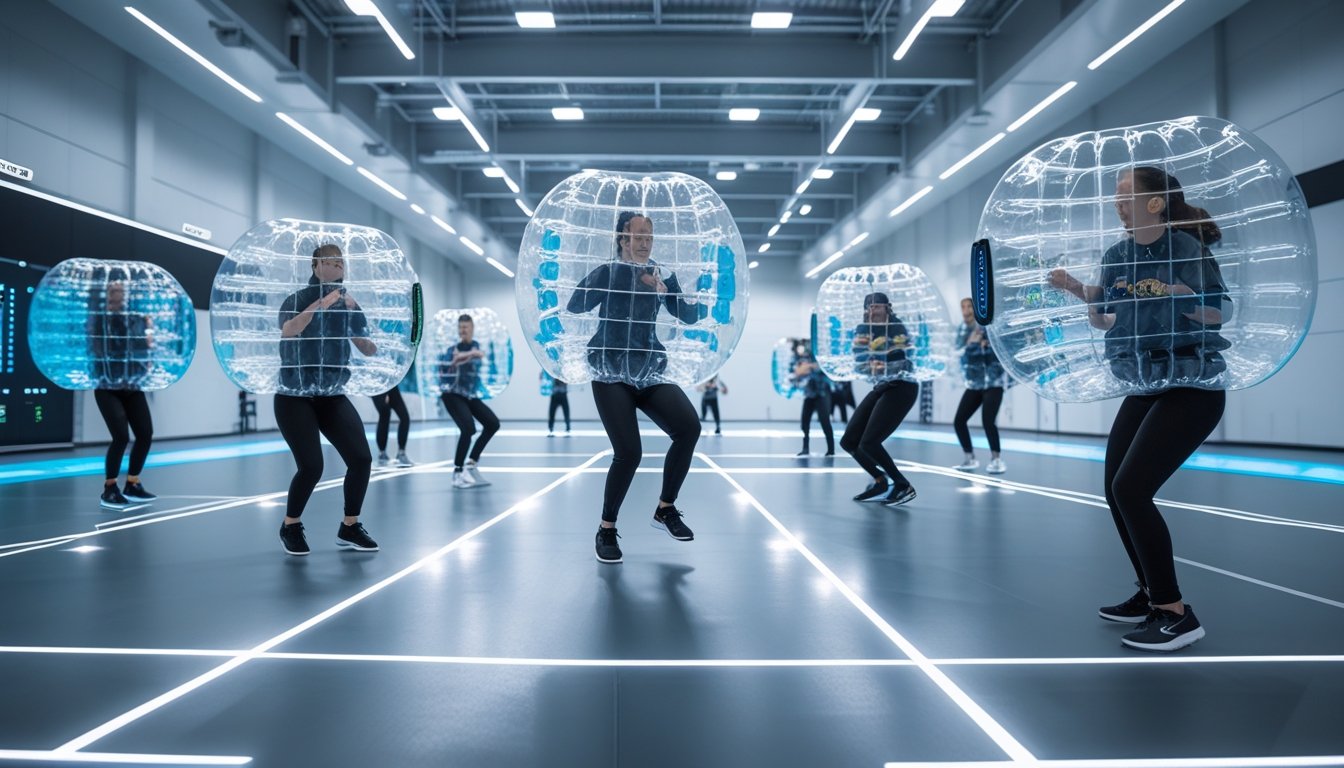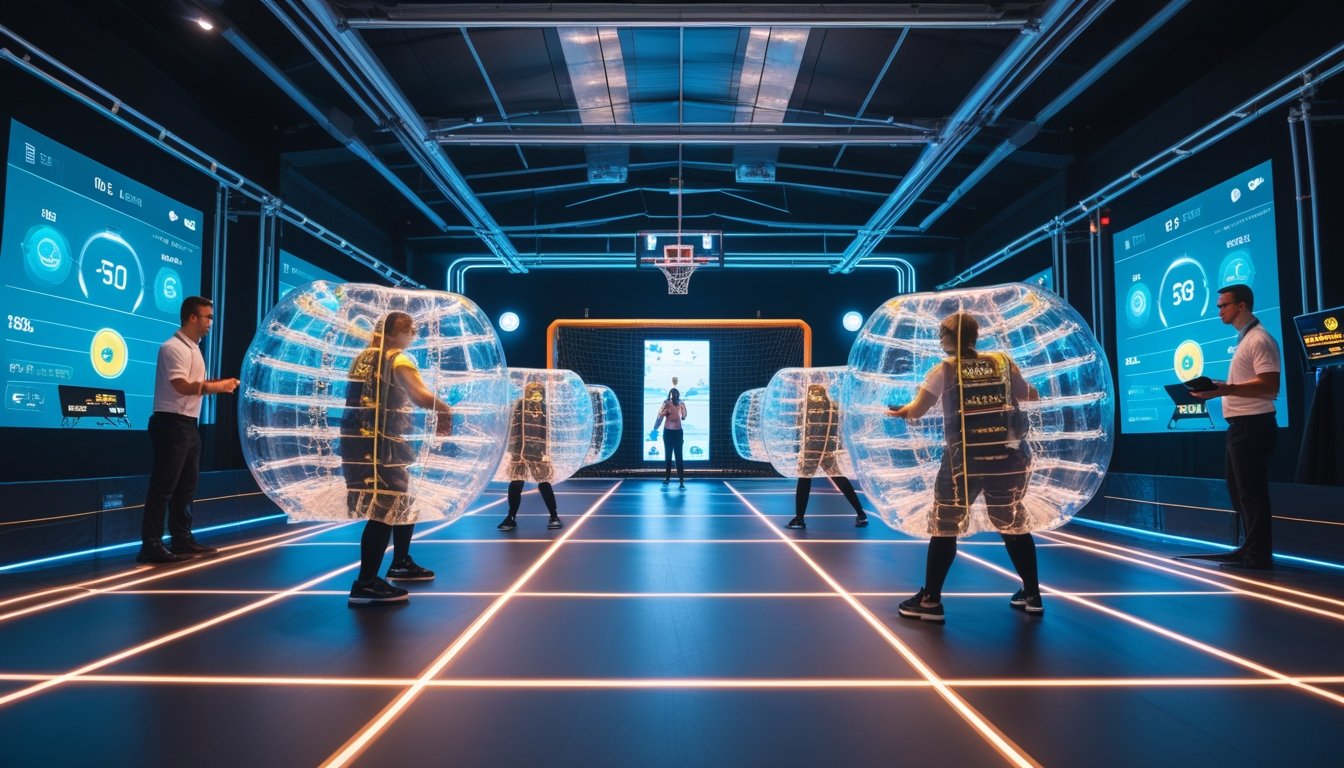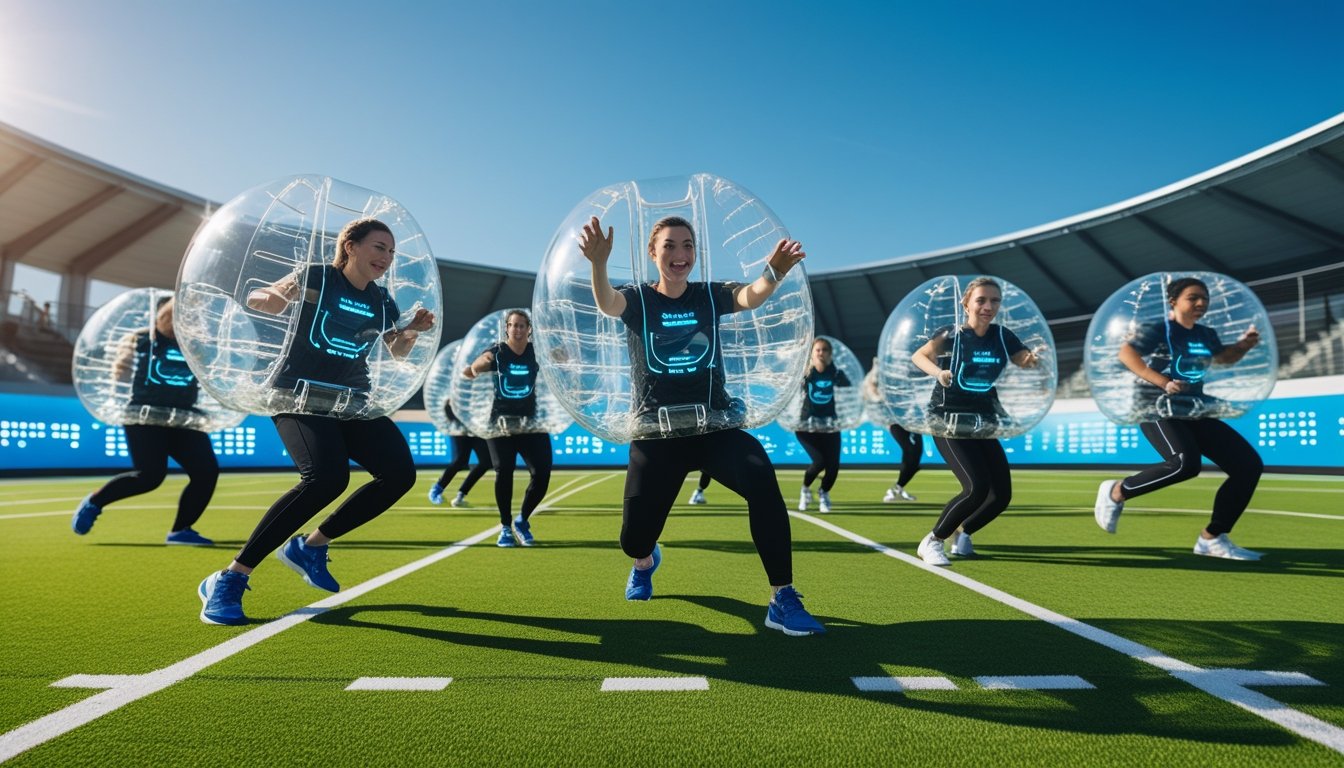Late updated: 12 Nov 2025 09:11
Written by: Emma Saunders
Exploring The Future Of Bubble Sports Technology: Innovations And Trends
Bubble sports have captured our imagination with their playful approach to traditional games. As these sports continue to grow in popularity, new technologies are transforming them from lighthearted pastimes into dynamic experiences. Technological innovations are at the heart of this evolution, enhancing the safety, engagement, and performance of bubble sports enthusiasts around the world. This transformation is creating a vibrant new chapter in the world of recreational activities, making bubble sports more immersive and accessible.

We find ourselves at a crossroads where traditional sports meet emerging technologies, resulting in a fascinating blend that appeals to both seasoned athletes and newcomers. The integration of wearable tech and AI-driven insights is revolutionising how players interact with these sports, providing real-time feedback and personalised experiences. By focussing on the convergence of technology and recreation, we gain a deeper appreciation for how innovations are reshaping the landscape of bubble sports, opening new possibilities for fans and athletes alike.
Join us as we explore the future implications of these advancements and what they mean for the bubble sports community. With each step forward, this playful yet competitive arena is being enriched, offering enhanced safety measures and enriched gameplay. The excitement surrounding these innovations invites us to imagine what the future holds for bubble sports and its enthusiasts.
Key Takeaways
- Technologies are enhancing bubble sports' safety and engagement.
- Innovations offer personalised and immersive sports experiences.
- Future advancements promise more dynamic and accessible gameplay.
Technological Innovations Shaping Bubble Sports

Recent advancements in technology are transforming how bubble sports are played and experienced. From AI-driven data analytics to the use of augmented and virtual reality, these innovations are enhancing player performance and increasing fan engagement.
AI and Data Analytics in Gameplay
Artificial intelligence and data analytics are rapidly changing bubble sports. AI algorithms provide insights into player performance by analysing performance metrics such as speed, agility, and endurance. This data helps players and coaches design effective training regimes.
Performance analytics tools are also making teamwork more efficient. By evaluating team performance, AI can recommend strategies tailored to both the strengths and weaknesses of players. Accurate data helps make informed decisions, optimising the overall game strategy and experience.
Augmented and Virtual Reality Enhancements
Augmented Reality (AR) and Virtual Reality (VR) technologies offer new dimensions to bubble sports. AR enhances the live experience by overlaying statistics and game information directly onto the field of play. This gives players real-time feedback and allows for more strategic decisions during matches.
VR takes fan engagement to another level by providing an immersive experience. Fans can virtually step into the game environment using VR headsets, experiencing the action from a player's perspective or from any angle they choose. This technology bridges the gap between audience engagement and player performance.
Wearable Technology and IoT Integration
Wearable technology is crucial in tracking physical and health metrics in bubble sports. Devices like smartwatches and sensors collect data on heart rate, movement, and energy expenditure. This information helps tailor individual training plans and monitor health conditions.
The Internet of Things (IoT) connects these wearables to a broader digital ecosystem. Real-time data transmission enables coaches and staff to make instant adjustments during games. Newer wearables can even alert users of potential injuries before they occur, significantly enhancing safety for athletes.
Advances in Smart Stadiums and Infrastructure
Smart stadiums ensure that bubble sports continue to innovate both on and off the field. Infrastructure is being upgraded with high-speed internet and digital screens, creating interactive environments for fans and players. These innovations offer personalised experiences, such as mobile apps for food orders or instant game replays.
Digital transformation extends to ticketing systems and crowd management, utilising data analytics to improve operations and safety. The integration of these technologies enhances spectator satisfaction while optimising the event management process. With smart infrastructure, bubble sports venues become hubs of cutting-edge innovation.
The Evolving Bubble Sports Experience

Bubble sports are rapidly evolving with technology at their helm, ushering an era of enhanced fan interactions, advanced training methods, and novel marketing avenues. This emerging landscape brings new opportunities to redefine these activities and their surrounding ecosystem.
Fan Engagement and Personalised Interactions
Fan engagement in bubble sports is experiencing a transformation. Virtual Reality (VR) and Augmented Reality (AR) are key technologies allowing fans to immerse themselves fully in the game. Fans can watch matches from different angles, simulating a live experience from home.
Fan personalisation is increasingly important. Through tailored content, such as customisable game highlights and interactive sessions, supporters feel more connected. These innovations foster a sense of community, increasing loyalty and creating a unique bond between the sport and its audience.
Coaching, Training, and Injury Prevention
With the advent of wearable technology, coaching and training regimens have become more data-driven. We can now monitor players' vital signs and biomechanics in real time, optimising performance and minimising injuries. Coaches have access to tools that provide insights into the athletes’ movements, allowing them to refine techniques and enhance skill development.
Injury prevention is pivotal. Systems that track impact forces during collisions aid in reducing injury risks. With this technology, we can implement simulated training environments to prepare athletes while ensuring their safety.
Rise of Social Media and Media Platforms
Social media and media platforms are reshaping how bubble sports are consumed. Platforms like Instagram and TikTok are essential for sharing real-time content, creating viral moments that captivate audiences globally. This allows us to cultivate a larger and more diverse fan base.
Moreover, interactive features such as live polls and direct communication with athletes or teams bring fans closer to the action. Blockchain technology ensures secure transactions and fair play, enhancing trust within our community. The digital shift enables a new wave of engagement tailored for the digital age.
Emerging Trends in Sponsorships and Market Expansion
In bubble sports, sponsorships are evolving beyond traditional methods. Brands now seek to connect with our audience through personalised and shared experiences. Collaborations with technology firms to deliver exclusive digital content are becoming the norm.
Market expansion is driven by these lucrative partnerships, facilitated by social media’s reach. Engaging sponsors with the diverse demographics of our fanbase unlocks new opportunities. This, coupled with the innovative ways to engage participants, positions bubble sports as a promising frontier in the global sports industry.
Frequently Asked Questions

In the evolving world of bubble sports, technology plays a pivotal role in elevating both player safety and performance. Various advancements, from smart materials to AI-driven analytics, are driving this transformation.
What advancements are being made in smart material integration for bubble sports equipment?
We're witnessing substantial progress in the use of smart materials to enhance bubble sports equipment. These innovations focus on improving durability and flexibility while maintaining the lightweight nature necessary for protection and movement. New materials offer enhanced impact absorption, thus reducing injury risks.
How is virtual reality enhancing the bubble sports experience?
Virtual reality (VR) is revolutionising how players and fans engage with bubble sports. By providing immersive experiences, VR allows participants to practice in simulated environments that replicate real match conditions. This enhancement elevates training effectiveness and offers spectators a unique perspective of the game.
Are there any significant developments in safety protocols for bubble sports?
Safety remains a primary concern in bubble sports. Recent developments include more stringent testing procedures for equipment and revisiting rules to minimise risks. These measures ensure that participants can enjoy the sport with reduced chances of injury, thanks to improved gear design and protocol adjustments.
What role is artificial intelligence playing in the evolution of bubble sports training programmes?
Artificial intelligence (AI) is becoming integral to bubble sports training programmes. AI systems analyse player data to customise training regimens, optimising performance and pinpointing areas for improvement. This personalised approach allows athletes to enhance their skills through targeted exercises and strategic guidance.
How is data analytics being utilised to improve performance in bubble sports?
Data analytics offers comprehensive insights into both individual and team performances in bubble sports. By collecting and analysing various metrics, such as movement patterns and reaction times, trainers can tailor strategies to enhance efficiency. This analytical approach enables players to make informed decisions and track their progress effectively.
What are the latest trends in wearable technology for athletes in bubble sports?
Athletes in bubble sports are increasingly adopting wearable technology to monitor their physical condition and performance. Devices track metrics such as heart rate, exertion levels, and fatigue to provide real-time feedback. These trends focus on maintaining optimal health and performance through precise data, aiding in recovery and injury prevention.
